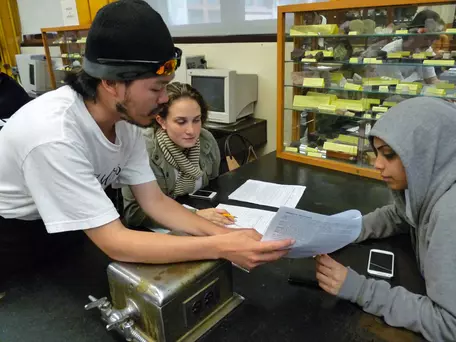Initial Publication Date: May 21, 2014
Provide Academic Support
Many students, including some from underrepresented minorities struggle in STEM disciplines because of gaps in their academic preparation. Without assistance these deficits can be insurmountable. Institutions of higher education need to concern themselves not only with supporting the students that are already on their campuses, but also in strengthening the pipeline that brings students into STEM disciplines.
Targeted outreach and recruitment activities can help institutions cultivate underrepresented minority students who are interested in science and math and might aspire to careers in these areas. Examples of the kinds of activities involved would be summer camps or programs in science, math and engineering for high school students; active engagement of faculty and graduate students in local K-12 schools to help spark students' interest and keep them interested; or bridge programs who help high school students adjust to the college experience.
The Expanding Underrepresented Minority Participation report ( This site may be offline. ) also suggests ways that institutions can better support the students they already have.
"Institutions should develop bridging programs to enable students to matriculate along the STEM education curriculum. These programs include academic preparation, guidance from mentors on mastering the transition, the development of connections between programs, and financial support as necessary. Key transition points at which bridging can help include the transition from community colleges to four-year institutions, from undergraduate to graduate programs, and from master's to doctoral programs." - NAS, NAE, IM (2011) p.183-184
Some students may not be making use of existing academic support structures on your campus. Most, if not all, campuses have tutoring offices, writing centers, and a variety of other structures that provide support for students with particular academic needs. However, many students need help to know when and how to seek such help. Others may see help-seeking as a failure on their part rather than a behavior that can lead to success. Engaged academic advisors and mentors can play a crucial role in helping students develop their awareness that not only do these services exist but that making the most of these extracurricular opportunities is a winning strategy.
Collaborate with Other Institutions »
Strong collaborations between institutions can leverage the strengths of each to help students of all kinds succeed. Recruiting and supporting diverse learners into the workforce requires connecting the web of learning experiences that support their ultimate success.
From a synthesis of lessons learned by InTeGrate Implementation Programs Beyond the Classroom »
A great deal of education happens outside of formal coursework, through mentoring, advising, internships, student research experiences, and many other activities. These resources from Building Strong Geoscience Departments can help faculty and students make the most of these opportunities. 